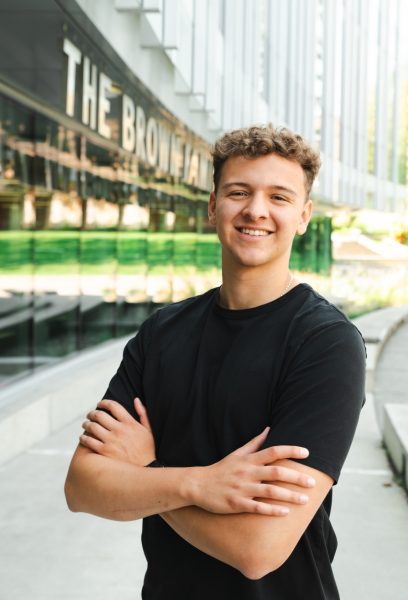Peer Academic Coach (PAC) and Supplemental Learning (SL) leader Manuel Centeno Duque first attended SL as a first-year student. “I enjoyed the study sessions, and they helped me study material without feeling like it was an overwhelming, time-consuming task. The leader told me they thought I would be a good candidate to apply for SL.”
Centeno Duque applied and started running the biology sessions in his second year. “Ever since then, I’ve been moving my way through peer leadership.”

An academic community allows for learning, processing and hearing different perspectives, and it also helps with accountability and staying on track. Regularly attending sessions not only carves time but also provides a consistent time to develop course comprehension.
“With SL, you’re making connections and pulling ideas and information apart. We use the scaffolding method to absorb the material, and that learning doesn’t only apply to a specific course; sessions boost skillset development and foster efficient learning, which benefits your academic and professional life,” Centeno Duque said.
The interactive qualities of SL include brainstorming through brain dumps on the board, playing games and engaging in activities that ingrain information in the memory. “There’s a lot of playfulness, laughter and collaboration. There are always jokes about little acronyms or phrases we use to remember things and you wouldn’t necessarily get that from rewriting the notes on your own,” Centeno Duque said.
“The team dynamic allows for different examples and points of view, which provides a deeper understanding of the material.” SL provides a community that “believes in you, encourages you or reminds you that you’re in university and learning what to learn and how to learn is part of the process.”
He also noted that the focus of peer-led programming is never strictly about academics: “It’s a time of growing up and working through the discomforts of dealing with roommates, relationships and other real-world struggles like housing and food insecurity. Students try to maintain their mental, physical and emotional health during high-pressure times, and we make space to unpack those issues. “It’s empowering to feel like someone listened to you and understood where you were at. I think that’s another one of the strengths of SL and PAC.”
While sessions are fun and informal, they are grounded in proven techniques taught by SL co-ordinator Elizabeth Templeman. “I’ve never had a supervisor like Elizabeth,” Centeno Duque says. “She’s more of a steward of the students than a boss, a peer mentor for peer mentors. She remembers everything about you and is interested in your humanity. Elizabeth is so proud and cares so much about each group member. SL makes you see who you are and what you want to be, and I want to be a leader like Elizabeth. She walks alongside you in your journey — and it’s not a formulated leadership technique — it’s just Elizabeth. She’s so genuine. SL is almost like your family.”
Of Centeno Duque and the other leaders, Templeman said: “I care so much about my leaders, they’re so cool. My whole job revolves around supporting, nourishing and encouraging them so they can do the same for hundreds of their peers.”
An avid volunteer, Centeno Duque founded a not-for-profit microbiology outreach program. “If you’re not involved, you should be! It’s a transforming, life-changing experience.”
From a young age, he saw his future as a scientist. “Science has always captivated my imagination. I’ve liked math, chemistry and biology since I was 12-13. I understand that it can be intimidating for some, so I like teaching kids about microbiology; inspiring the next generation to like science is rewarding. You’re creating a ripple effect that other people will eventually pay forward. And if you’re still figuring it out, that’s OK. There’s not one answer to a problem nor a single pathway for a student.”
Centeno Duque encourages students to access academic support as soon as possible but says it’s never too late to participate. “SL sessions start the second week of classes and you’re welcome to drop in anytime up to the end-of-semester exam review.”
Whenever he asks students why they don’t attend SL sessions, he said the responses often fall into two camps. “Either they’re already getting a good grade in the class and don’t think they’d benefit, or they are genuinely struggling with the subject and think they’ll be exposed when they need help understanding the material. If I hadn’t gone to SL as a first year, I don’t know what I would be doing as well right now. If you never have the experience, you’ll never see its value.”
Check the website for the Supplemental Learning schedule or to book an appointment with a peer academic coach.

